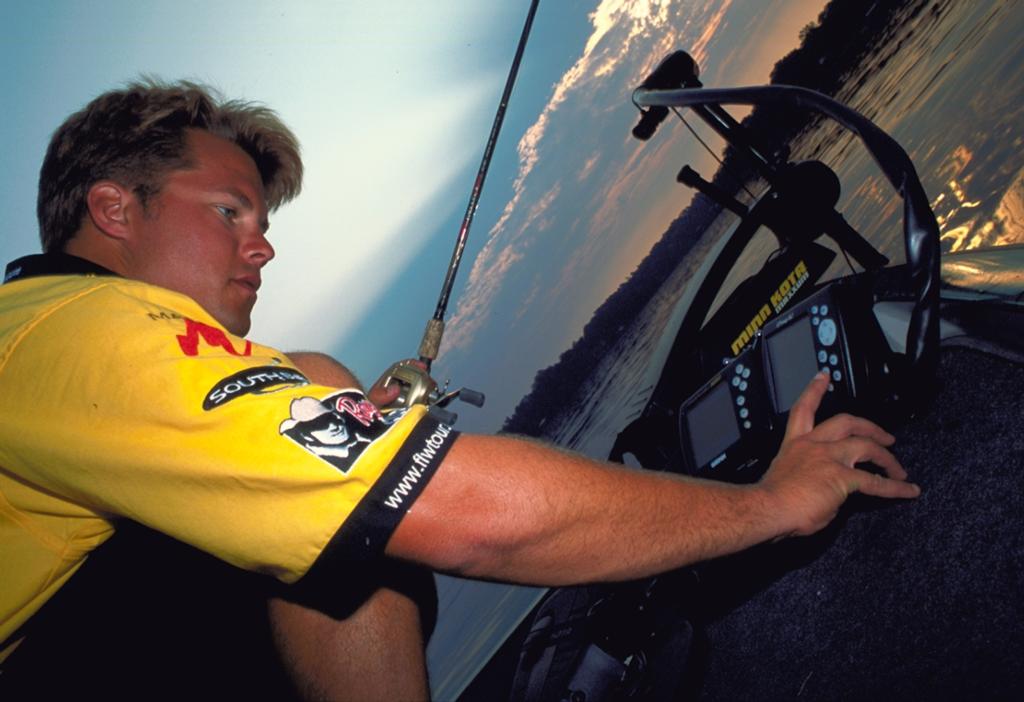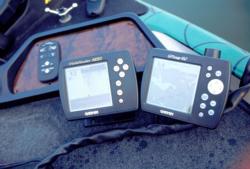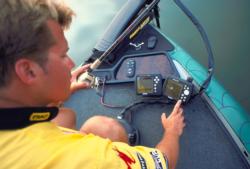Stealthy GPS with Scott Martin

Scott Martin’s approach to GPS use is innovative
Global Positioning System technology has found a permanent home in competitive bass fishing. Look behind the console of nearly any full-time touring pro’s boat and you will find some kind of GPS capability. For professional bass anglers, GPS is no longer a luxury, it’s a necessity.
Conventionally, GPS units are mounted on the console of a boat where an angler can see the unit when he is driving. Stanley pro Scott Martin has taken GPS use a step farther – to the front deck where he can see the unit while he is fishing.
“I have two GPS units on my boat,” says Martin. “Two GPSs may sound excessive, but having one on the front deck has tremendous advantages in competition.”
Martin has mounted a Garmin GPSmap 162 on his front deck right next to his depth finder. The unit has a built-in antenna with a 12-channel receiver and is WASS-enabled for accurate positioning.
Martin contends that the primary advantages of a front-deck GPS are efficiency and stealth during competition.
“With a GPS on the console, you have to walk back to the console every time you want to save a position,” says Martin. “If you are around competitors, it is like waving a flag that says, `Hey, I got a bite here.'”
 With a GPS unit on the deck, Martin can inconspicuously reach down and touch the save button on the unit. “It looks like I am adjusting my depth finder, but I am actually saving a waypoint,” he says.
With a GPS unit on the deck, Martin can inconspicuously reach down and touch the save button on the unit. “It looks like I am adjusting my depth finder, but I am actually saving a waypoint,” he says.
Martin got the full benefit of a front-deck GPS unit at the 2002 Forrest Wood Open on Lake Champlain where he finished fourth. While practicing, Martin was able to mark dozens of smallmouth beds without having to walk to the console each time.
Martin says the real payoff came during the event when he used the front-deck unit like a bass-fishing treasure map that pointed him back to every fish with pinpoint accuracy.
“The Garmin 162 is extremely precise,” says Martin. “It gets me to within 10 feet of a single bed even with the trolling motor set on a slow speed. There is no more guessing or running over fish. Many times I see the fish just before the unit lets me know I am on it. After I catch the fish, I simply look at the unit for directions to the next bed.”
At the FLW Tour Championship on Cross Lake, Martin used the unit to mark specific cypress trees that were productive. “Cross Lake has thousands of cypress trees,” reports Martin. “When I got a bite on a specific tree in practice, I would shake the fish off and hit the save button. Sometimes I was within 50 feet of competitors, and they never knew what happened.”
Martin also suggests that using a GPS unit next to his depth finder while he is fishing is another bonus.
 “If I am Carolina rigging a point and I see a brush pile on the screen, I simply reach down, push a button and it’s saved,” remarks Martin. “When I return, I don’t have to cross triangulate, line up with anything, or even drop a buoy marker. At all times, and from any angle, I can see exactly where the brush pile is as I fish around it, just by looking down.”
“If I am Carolina rigging a point and I see a brush pile on the screen, I simply reach down, push a button and it’s saved,” remarks Martin. “When I return, I don’t have to cross triangulate, line up with anything, or even drop a buoy marker. At all times, and from any angle, I can see exactly where the brush pile is as I fish around it, just by looking down.”
Martin uses a Garmin GPSmap 182 for his console unit. He adds that another benefit of two GPS units is being able to store important waypoints in the dash unit and inconsequential points in the deck unit.
“When you only have one unit, you store everything in it – insignificant points and important points. After a few tournaments you have a unit cluttered with numbers, some of which you can erase and some you want to keep. I only use the front unit for insignificant points that change from year to year like beds. Anything significant I transfer to the console unit. That way I can clean out my front unit after each tournament, and my console unit retains the permanent numbers.”
“GPS units on the console are great for navigation and marking general areas,” says Martin. “But fishing with one in front of me at all times allows me to get the most out of GPS technology and fine-tune my fishing.”